ABSTRACT
Thailand’s economy and agricultural supply chain has encountered several obstacles in recent years due to external factors beyond its control, including the trade war between the United States and China, the COVID-19 pandemic, and the war between Russia and Ukraine. This paper analyzes how those issues influence the Thai economy and agriculture supply chain, and provide recommendations on what Thailand could do to avoid future difficulties. The COVID-19 pandemic is not all that bad for Thailand. Several governments have stockpiled food in response to concerns about food security and temporary export restrictions imposed by some agricultural exporting countries. As a result, Thailand sold more agricultural commodities in a shorter period. However, rice exports in 2020 fell due to baht appreciation and high production costs, resulting in Thailand's weaker competitiveness. Russia-Ukraine conflict has raised the expenses of Thailand's supply chain in three important areas: feeds, fertilizers, and energy prices because both countries were major exporters of grains and fertilizers. To avoid the following challenges, such as climate change, the government should have policies that support all sectors involved in the agricultural supply chain.
Keywords: Thailand, agriculture, supply chain, Russia-Ukraine war
INTRODUCTION
In recent years, the global supply chain and the economic system have encountered numerous difficulties. It began with a trade conflict between the United States and China. The trade dispute started in July 2018 and has since intensified (Mullen, 2021). The outbreak of the COVID-19 pandemic at the end of 2019 disrupted economic activities, and since February, 2022, the war between Russia and Ukraine which PPTV reports (2023) indicated no signs of ending, have affected the global and Thai agricultural supply chains to this day.
Thailand and the country's agricultural supply chain and food security, despite facing ripples of obstacles, as indicated by Pimoljinda and Hongwiset (2023) is still influenced by the above events to a mild extent. As a whole, from Table 1, since 2020, the year-on-year growth of the quarterly gross national product, as measured by the production of the agricultural sector, has shown a brief contraction and has tended to increase steadily compared to the same period last year from 2022 to the present.
Thailand also had higher Logistics Performance Index (LPI) score but lower ranking. If we examine the details of the most recent data from 2023, we will find that there are still some aspects of the Thai supply chain that need improvement, which will be addressed in the subsequent paragraphs.

Figure 1 shows the LPI Score of Thailand in 2010, 2012, 2014, 2016, 2018, and 2023 based on 6 components: Customs, Infrastructure, International Shipments, Logistics Competence and Quality, Timeliness, and Tracking and Tracing Score. In Figure 1, the World Bank (2023) reported that the Logistics Performance Index 2023 for Thailand was ranked 34th out of 139 countries, lowering from 32nd in 2018 because only one component, timeliness, was reduced from 3.81 in 2018 to 3.50 in 2023 (Figure 2). Improving customs procedures with a nationwide single window (NSW) can help shorten the time of import-export processes, but the effect of outside factors, for example, the Russia-Ukraine war, was out of control.
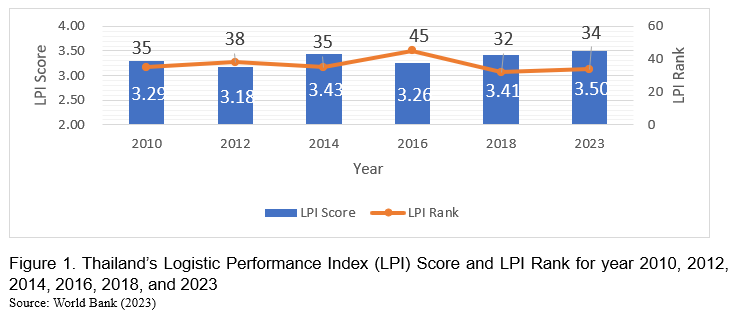
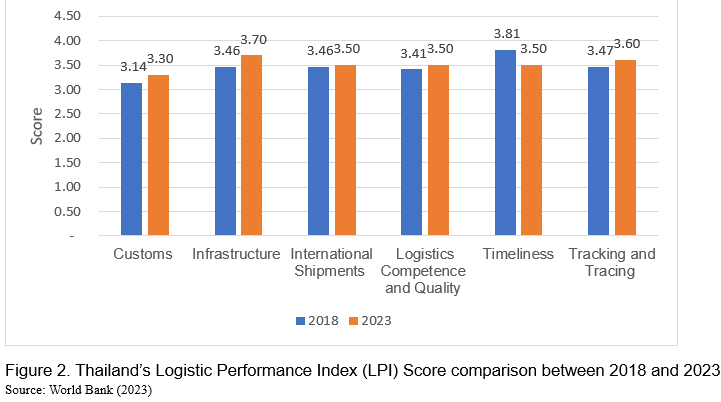
EFFECTS ON THAILAND’S SUPPLY CHAIN
If we take a closer look at the effects of the proliferation of the COVID-19 pandemic and the war between Ukraine and Russia, the Thai agricultural supply chains are affected in the following ways:
The impacts of the COVID-19 pandemic
As a result of the declaration of the emergency decree in all areas of the Kingdom of Thailand, the COVID-19 pandemic has disrupted the Thai agricultural supply chain. In 2020, the government, led by Prime Minister Gen. Prayut Chan-o-cha, implemented restrictions on access to high-risk locations with regards to the transmission of the COVID-19 virus. Tourism and the entertainment industries were directly impacted by the closure of places susceptible to infection, such as boxing stadiums and sports stadiums, and the prohibition of entry to Thailand for anyone who has not been granted a waiver (Sima, 2022). Consequently, food prices and demand vacillated during this period. This is apparently based on the cost of staple foods like poultry, eggs, and pork. The retail pricing (Figure 3) allows for the observation of short-term changes in 2020. The retail price of red meat exhibits greater volatility compared to that of chicken due to a variety of variables, such as:
1) African Swine Fever epidemic problems that spread widely at the end of 2021, which caused the price to adjust from US$4.52/kg in December 2021 to US$5.97/kg in January 2022.
2) Swine production cost has continued increasing from transportation costs due to oil prices, animal feed cost (which account for more than 70% of the total cost) has increased since animal feed has to be imported from abroad. Also, small swine farms suffered losses in operation and went out of business.
3) The measures of buying three parts of domestic corn for importing one part of wheat was burdensome and increased animal feed cost. The importation of wheat by animal feed producers has a significant impact on maize prices. Consequently, the Committee on Maize Policy and Management has established a regulation stipulating that for every one part of imported wheat, these producers must purchase three parts of domestic maize. However, during the off-season, the purchase ratio is reduced to one part of imported wheat for every two parts of domestic corn. This adjustment is made to accommodate situations where wheat importers may encounter difficulties in procuring domestic corn. Later, the Minister of the Ministry of Commerce was pending this measure until the end of July 2022.
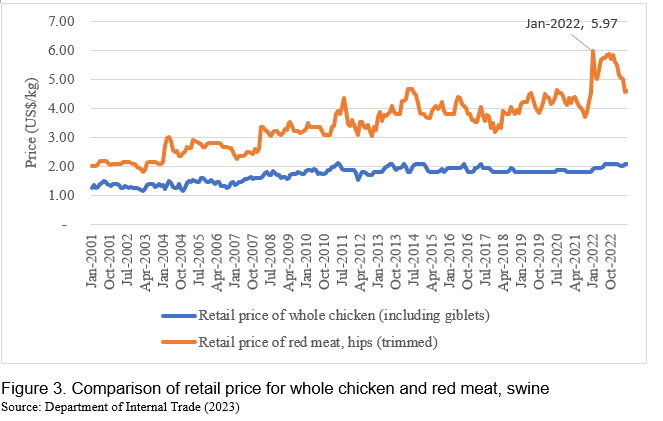
The price of layer eggs exhibited more volatility compared to that of duck eggs (Figure 4). Layer egg price was under manipulation by several parties, for example, the Department of Internal Trade, Hen-egg farmers cooperatives, the layer farmers association, the association of hen-egg farmers, traders, and exporters. The Office of Agricultural Economics is responsible for surveying the cost of hen-egg production and found that small farms had higher production costs compared to large farms. Since 2022, the network of layer farmers associations has announced and updated egg suggested price for several times; for example, on July 13, 2023, the suggested price for assorted eggs was US$11.48/100 egg. Notice that in 2018, the retail assorted egg price was US$8.64/100 eggs; in 2019 and 2020, it was US$9.19/100 eggs; in 2021, it went up to US$9.50/100 eggs; and in 2022 (Jan.–Jun.), it was US$11.66/100 eggs. (Department of Internal Trade, 2023)
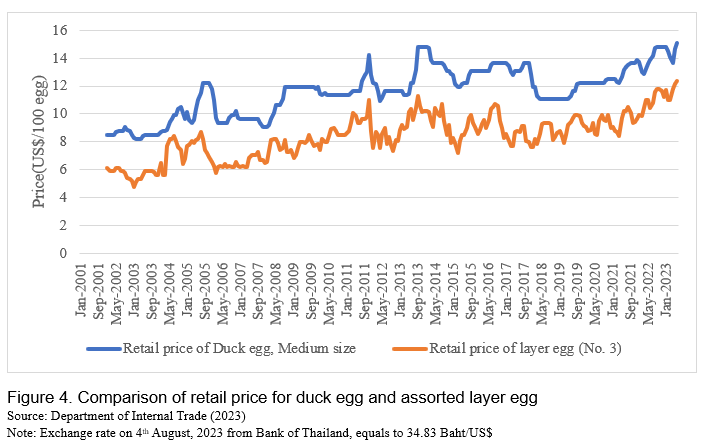
However, the spread of the COVID-19 virus is not all that bad for Thailand. According to Thammachote and Trochim (2021), several nations have stockpiled food due to worries about food security and temporary limits on exports imposed by some agricultural exporting countries. Therefore, Thailand exported more agricultural goods in a shorter period of time, but generally, Thailand's rice exports in 2020 declined owing to baht appreciation and high production costs, resulting in Thailand's lower competitiveness.
The overall management of the COVID-19 pandemic in Thailand is commendable. It appeared that the Director-General of the World Health Organization (WHO), Dr. Tedros Adhanom Ghebreyesu, corresponded with Thai Deputy Prime Minister and Public Health Minister Anutin Charnvirakul via a formal letter. The correspondence further notified Minister Anutin of Thailand's significant role as an early adopter of the Universal Health and Preparedness Review (UHPR) strategy for public health crises and its effective management of the COVID-19 pandemic (National News Bureau of Thailand, 2022).
The impact of the Russia-Ukraine conflict
The war between Russia and Ukraine has increased the costs of Thailand's supply chain in three key areas: feeds, fertilizers, and energy prices. Supply Chain Guru (2022) indicates that Russia and Ukraine are the world's major exporters of feed raw materials. The war caused a shortage of feed ingredients. The price of maize for animal feed in Thailand rose above the world market to US$0.34 in 2021, which affected the overall price of meat produced during that period.
Because Russia is a major exporter of raw materials used in the production of fertilizers, the war therefore pushed up the price of fertilizers in 2022 (at present, the price of fertilizers has decreased significantly compared to the peak in 2022, although it is still very high, (Figure 5).
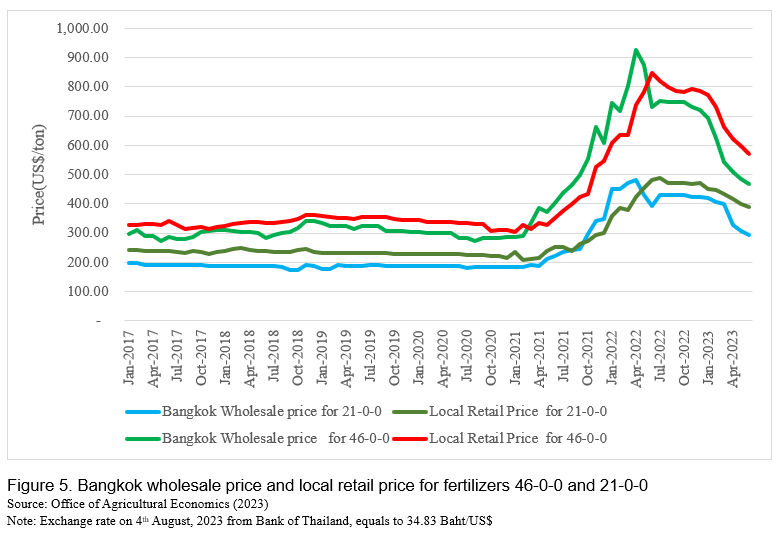
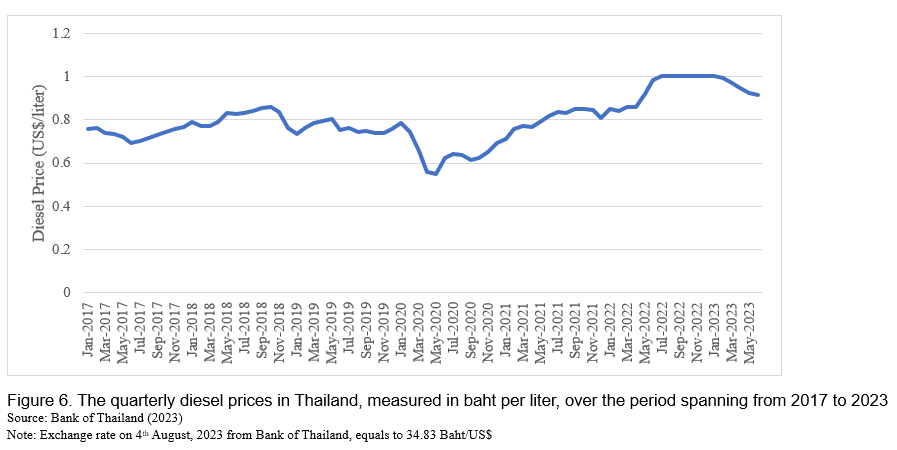
Russia is a significant oil exporter. The conflict between Russia and Ukraine has increased oil prices in Thailand. Indeed, numerous variables exerted influence on the fluctuations of domestic oil prices. However, it is evident that diesel prices in Thailand reached their highest point shortly following the commencement of the conflict between Russia and Ukraine in 2022 (Figure 6). Logistics, whose major business is transportation, has been hit the worst (Supply Chain Guru, 2022). The COVID-19 pandemic, on the other hand, will have little influence on the food transportation industry because demand for takeout is higher owing to travel and work limitations.
The forthcoming difficulties and policy directions
Thailand is one of the most interesting countries for doing business. Under the scenario of global supply chain prompted by global trade dynamics and the ongoing pandemic, KPMG's research (2021) indicated that the relocation of international supply chains has led to the emergence of South Asia and the Association of Southeast Asian Nations (ASEAN) region as appealing options for companies. In addition, Dr. Chalermchai Sri-on, Minister of Agriculture and Cooperatives, has established the Future Food Policy as one of the main policies to create new opportunities for the country along the agricultural and food chains to meet the needs of consumers around the world today (Ministry news, 2021). In brief, future food is classified into four categories based on food characteristics and production methodologies: functional food, novel food, medical food, and organic food. The government has a policy to proactively apply to future foods that are in line with current trends in food security and food safety.
The Thai government has implemented several strategic initiatives aimed at integrating technology into the realms of food safety and delivery services. The Bio-Circular-Green (BCG) economic model has been developed by the academic community and subsequently supported by the Thai government as a key economic strategy for Thailand. According to the Royal Thai Embassy (2021), the BCG model leverages Thailand's biological diversity and cultural richness, while also utilizing technology and innovation to facilitate the country's transition towards an economy driven by value and creativity. This strategy can be facilitated by the implementation of research and development initiatives, as well as the utilization of advanced technologies such as smart farming and technology aimed at ensuring food and product safety. Furthermore, Pimoljinda and Hongwiset (2023) proposed recommendations about the Thai policy directions. They emphasized the importance of addressing the types and techniques of planting, boosting agricultural productivity, and implementing plant protection strategies for farmers. These discussions should take place at both the policy and practice levels. The fundamental prerequisites for the recovery and enhancement of food safety and productivity encompass advancements in technological knowledge, equipment, and the allocation of subsidies. In the context of marketing, it is imperative for the government to formulate a comprehensive strategy aimed at implementing alternative logistics and effectively managing production costs. This approach is crucial to ensure that product prices remain aligned with consumer demand and continue to be affordable.
Although Thailand is one of the affected nations, it is not any different from other nations in terms of mitigating these effects. We anticipate a significant improvement in 2023, despite the uncertainties of the global economy, the agricultural policies of partner nations, and climate change such as El Niňo, which could reduce production efficiency and increase future supply chain costs. However, according to a research conducted by Ketudat and Jeenananta in 2021, Thai logistics companies are highly adaptable. It must be a part of the Thai agricultural supply chain for operations to operate smoothly.
CONCLUSION
Thailand has experienced several challenges in recent years as a result of uncontrolled external factors such as the trade war between the United States and China, the outbreak of the COVID-19 pandemic, and the ongoing war between Russia and Ukraine. These factors impacted feeds, fertilizers, and fuel (3F) cost. The three Fs were input factors utilized to produce food for the country. As a result, these issues will affect the entire country. Food costs in Thailand will inevitably rise, affecting the Thai economy while other countries concerning about food safety may still want to import food products from Thailand. To prevent the other impediment, such as climate change, the government should implement policies that benefit all segments of the agricultural supply chain.
REFERENCES
Bank of Thailand. (2023). Price of certain manufactured goods. Retrieved July 30, 2023, from https://app.bot.or.th/BTWS_STAT/statistics/BOTWEBSTAT.aspx?reportID=90&l...
Department of Internal Trade. (2023). Wholesale and retail prices for agricultural goods. Retrieved July 31, 2023, from https://pricelist.dit.go.th/main_price.php. (In Thai)
Ketudat, S. & Jeenanunta, C. (2021). Impact of the COVID-19 pandemic on logistics firms and their resilience: case studies in Thailand. Engineering Management in Production and Services,13(3) 86-98. https://doi.org/10.2478/emj-2021-0023
KPMG. (2021). Rethinking supply chains in Asia Pacific: A study on supply chain realignment and competitiveness across high growth markets, October 2021, home.kpmg.
Ministry news. (2021). "Chalermchai" pushes forward the food policy of the future. Retrieved July 30, 2023, from https://www.samapan-thainews.com/8212 (in Thai)
Mullen, A. (2021). US-China trade war timeline: key dates and events since July 2018. Retrieved July 30, 2023, from https://www.scmp.com/economy/china-economy/article/3146489/us-china-trad...
National News Bureau of Thailand. (2022). WHO praises Thailand’s strength in handling COVID-19. Retrieved July 30, 2023, from https://thainews.prd.go.th/en/news/detail/TCATG221113110534631.
Office of Agricultural Economics. (2023). Fertilizer price for Bangkok wholesale price and local retail price. Retrieved July 31, 2023, from https://www.oae.go.th/view/1/ปัจจัยการผลิต/TH-TH#. (In Thai)
Office of the National Economic and Social Development. (2023). QGDP dashboard. Retrieved July 30, 2023, from https://lookerstudio.google.com/reporting/52a283c8-91f9-4b35-8157-2b2b42...
Pimoljinda, T., & Hongwiset, S. (2023). Food safety, consumer behaviour, and government policy after the COVID-19 pandemic in Thailand: A review. KnE Social Sciences, 8(3), 249–259. https://doi.org/10.18502/kss.v8i3.12832.
PPTV Online. (2023). The 500-day “Russian-Ukrainian War” summarizes the terrible effects of the war. Retrieved July 30, 2023, from https://www.pptvhd36.com/news/ต่างประเทศ/200561 (In Thai)
Royal Thai Embassy, Washington D.C. (2021). Bio-Circular-Green Economic Model (BCG). Retrieved August 6, 2023, from https://thaiembdc.org/bio-circular-green-bcg/
Sima, S. (2022). Measures to lockdown and control of COVID-19 in Thailand. Retrieved July 30, 2023, from https://library.parliament.go.th/th/radioscript-rr2565-jan3 (In Thai)
Supply Chain Guru. (2022). The impact of the Ukrainian-Russian war on the Thai supply chain. Retrieved July 30, 2023, from https://supplychainguru.co.th/articles/news/ukraine-russai-war-impact-to...
Thammachote, P. & Trochim, J. (2021). The Impact of the COVID-19 Pandemic on Thailand’s Agricultural Export Flows. PRCI Research Papers 320709, Michigan State University, Department of Agricultural, Food and Resource Economics, Food Security Group.
World Bank. (2023). Logistics performance index: International scorecard page. Retrieved July 28, 2023, from https://lpi.worldbank.org/international/scorecard.


Thai Agricultural Supply Chain: Overcoming Past Obstacles and Preparing for Future Challenges
ABSTRACT
Thailand’s economy and agricultural supply chain has encountered several obstacles in recent years due to external factors beyond its control, including the trade war between the United States and China, the COVID-19 pandemic, and the war between Russia and Ukraine. This paper analyzes how those issues influence the Thai economy and agriculture supply chain, and provide recommendations on what Thailand could do to avoid future difficulties. The COVID-19 pandemic is not all that bad for Thailand. Several governments have stockpiled food in response to concerns about food security and temporary export restrictions imposed by some agricultural exporting countries. As a result, Thailand sold more agricultural commodities in a shorter period. However, rice exports in 2020 fell due to baht appreciation and high production costs, resulting in Thailand's weaker competitiveness. Russia-Ukraine conflict has raised the expenses of Thailand's supply chain in three important areas: feeds, fertilizers, and energy prices because both countries were major exporters of grains and fertilizers. To avoid the following challenges, such as climate change, the government should have policies that support all sectors involved in the agricultural supply chain.
Keywords: Thailand, agriculture, supply chain, Russia-Ukraine war
INTRODUCTION
In recent years, the global supply chain and the economic system have encountered numerous difficulties. It began with a trade conflict between the United States and China. The trade dispute started in July 2018 and has since intensified (Mullen, 2021). The outbreak of the COVID-19 pandemic at the end of 2019 disrupted economic activities, and since February, 2022, the war between Russia and Ukraine which PPTV reports (2023) indicated no signs of ending, have affected the global and Thai agricultural supply chains to this day.
Thailand and the country's agricultural supply chain and food security, despite facing ripples of obstacles, as indicated by Pimoljinda and Hongwiset (2023) is still influenced by the above events to a mild extent. As a whole, from Table 1, since 2020, the year-on-year growth of the quarterly gross national product, as measured by the production of the agricultural sector, has shown a brief contraction and has tended to increase steadily compared to the same period last year from 2022 to the present.
Thailand also had higher Logistics Performance Index (LPI) score but lower ranking. If we examine the details of the most recent data from 2023, we will find that there are still some aspects of the Thai supply chain that need improvement, which will be addressed in the subsequent paragraphs.
Figure 1 shows the LPI Score of Thailand in 2010, 2012, 2014, 2016, 2018, and 2023 based on 6 components: Customs, Infrastructure, International Shipments, Logistics Competence and Quality, Timeliness, and Tracking and Tracing Score. In Figure 1, the World Bank (2023) reported that the Logistics Performance Index 2023 for Thailand was ranked 34th out of 139 countries, lowering from 32nd in 2018 because only one component, timeliness, was reduced from 3.81 in 2018 to 3.50 in 2023 (Figure 2). Improving customs procedures with a nationwide single window (NSW) can help shorten the time of import-export processes, but the effect of outside factors, for example, the Russia-Ukraine war, was out of control.
EFFECTS ON THAILAND’S SUPPLY CHAIN
If we take a closer look at the effects of the proliferation of the COVID-19 pandemic and the war between Ukraine and Russia, the Thai agricultural supply chains are affected in the following ways:
The impacts of the COVID-19 pandemic
As a result of the declaration of the emergency decree in all areas of the Kingdom of Thailand, the COVID-19 pandemic has disrupted the Thai agricultural supply chain. In 2020, the government, led by Prime Minister Gen. Prayut Chan-o-cha, implemented restrictions on access to high-risk locations with regards to the transmission of the COVID-19 virus. Tourism and the entertainment industries were directly impacted by the closure of places susceptible to infection, such as boxing stadiums and sports stadiums, and the prohibition of entry to Thailand for anyone who has not been granted a waiver (Sima, 2022). Consequently, food prices and demand vacillated during this period. This is apparently based on the cost of staple foods like poultry, eggs, and pork. The retail pricing (Figure 3) allows for the observation of short-term changes in 2020. The retail price of red meat exhibits greater volatility compared to that of chicken due to a variety of variables, such as:
1) African Swine Fever epidemic problems that spread widely at the end of 2021, which caused the price to adjust from US$4.52/kg in December 2021 to US$5.97/kg in January 2022.
2) Swine production cost has continued increasing from transportation costs due to oil prices, animal feed cost (which account for more than 70% of the total cost) has increased since animal feed has to be imported from abroad. Also, small swine farms suffered losses in operation and went out of business.
3) The measures of buying three parts of domestic corn for importing one part of wheat was burdensome and increased animal feed cost. The importation of wheat by animal feed producers has a significant impact on maize prices. Consequently, the Committee on Maize Policy and Management has established a regulation stipulating that for every one part of imported wheat, these producers must purchase three parts of domestic maize. However, during the off-season, the purchase ratio is reduced to one part of imported wheat for every two parts of domestic corn. This adjustment is made to accommodate situations where wheat importers may encounter difficulties in procuring domestic corn. Later, the Minister of the Ministry of Commerce was pending this measure until the end of July 2022.
The price of layer eggs exhibited more volatility compared to that of duck eggs (Figure 4). Layer egg price was under manipulation by several parties, for example, the Department of Internal Trade, Hen-egg farmers cooperatives, the layer farmers association, the association of hen-egg farmers, traders, and exporters. The Office of Agricultural Economics is responsible for surveying the cost of hen-egg production and found that small farms had higher production costs compared to large farms. Since 2022, the network of layer farmers associations has announced and updated egg suggested price for several times; for example, on July 13, 2023, the suggested price for assorted eggs was US$11.48/100 egg. Notice that in 2018, the retail assorted egg price was US$8.64/100 eggs; in 2019 and 2020, it was US$9.19/100 eggs; in 2021, it went up to US$9.50/100 eggs; and in 2022 (Jan.–Jun.), it was US$11.66/100 eggs. (Department of Internal Trade, 2023)
However, the spread of the COVID-19 virus is not all that bad for Thailand. According to Thammachote and Trochim (2021), several nations have stockpiled food due to worries about food security and temporary limits on exports imposed by some agricultural exporting countries. Therefore, Thailand exported more agricultural goods in a shorter period of time, but generally, Thailand's rice exports in 2020 declined owing to baht appreciation and high production costs, resulting in Thailand's lower competitiveness.
The overall management of the COVID-19 pandemic in Thailand is commendable. It appeared that the Director-General of the World Health Organization (WHO), Dr. Tedros Adhanom Ghebreyesu, corresponded with Thai Deputy Prime Minister and Public Health Minister Anutin Charnvirakul via a formal letter. The correspondence further notified Minister Anutin of Thailand's significant role as an early adopter of the Universal Health and Preparedness Review (UHPR) strategy for public health crises and its effective management of the COVID-19 pandemic (National News Bureau of Thailand, 2022).
The impact of the Russia-Ukraine conflict
The war between Russia and Ukraine has increased the costs of Thailand's supply chain in three key areas: feeds, fertilizers, and energy prices. Supply Chain Guru (2022) indicates that Russia and Ukraine are the world's major exporters of feed raw materials. The war caused a shortage of feed ingredients. The price of maize for animal feed in Thailand rose above the world market to US$0.34 in 2021, which affected the overall price of meat produced during that period.
Because Russia is a major exporter of raw materials used in the production of fertilizers, the war therefore pushed up the price of fertilizers in 2022 (at present, the price of fertilizers has decreased significantly compared to the peak in 2022, although it is still very high, (Figure 5).
Russia is a significant oil exporter. The conflict between Russia and Ukraine has increased oil prices in Thailand. Indeed, numerous variables exerted influence on the fluctuations of domestic oil prices. However, it is evident that diesel prices in Thailand reached their highest point shortly following the commencement of the conflict between Russia and Ukraine in 2022 (Figure 6). Logistics, whose major business is transportation, has been hit the worst (Supply Chain Guru, 2022). The COVID-19 pandemic, on the other hand, will have little influence on the food transportation industry because demand for takeout is higher owing to travel and work limitations.
The forthcoming difficulties and policy directions
Thailand is one of the most interesting countries for doing business. Under the scenario of global supply chain prompted by global trade dynamics and the ongoing pandemic, KPMG's research (2021) indicated that the relocation of international supply chains has led to the emergence of South Asia and the Association of Southeast Asian Nations (ASEAN) region as appealing options for companies. In addition, Dr. Chalermchai Sri-on, Minister of Agriculture and Cooperatives, has established the Future Food Policy as one of the main policies to create new opportunities for the country along the agricultural and food chains to meet the needs of consumers around the world today (Ministry news, 2021). In brief, future food is classified into four categories based on food characteristics and production methodologies: functional food, novel food, medical food, and organic food. The government has a policy to proactively apply to future foods that are in line with current trends in food security and food safety.
The Thai government has implemented several strategic initiatives aimed at integrating technology into the realms of food safety and delivery services. The Bio-Circular-Green (BCG) economic model has been developed by the academic community and subsequently supported by the Thai government as a key economic strategy for Thailand. According to the Royal Thai Embassy (2021), the BCG model leverages Thailand's biological diversity and cultural richness, while also utilizing technology and innovation to facilitate the country's transition towards an economy driven by value and creativity. This strategy can be facilitated by the implementation of research and development initiatives, as well as the utilization of advanced technologies such as smart farming and technology aimed at ensuring food and product safety. Furthermore, Pimoljinda and Hongwiset (2023) proposed recommendations about the Thai policy directions. They emphasized the importance of addressing the types and techniques of planting, boosting agricultural productivity, and implementing plant protection strategies for farmers. These discussions should take place at both the policy and practice levels. The fundamental prerequisites for the recovery and enhancement of food safety and productivity encompass advancements in technological knowledge, equipment, and the allocation of subsidies. In the context of marketing, it is imperative for the government to formulate a comprehensive strategy aimed at implementing alternative logistics and effectively managing production costs. This approach is crucial to ensure that product prices remain aligned with consumer demand and continue to be affordable.
Although Thailand is one of the affected nations, it is not any different from other nations in terms of mitigating these effects. We anticipate a significant improvement in 2023, despite the uncertainties of the global economy, the agricultural policies of partner nations, and climate change such as El Niňo, which could reduce production efficiency and increase future supply chain costs. However, according to a research conducted by Ketudat and Jeenananta in 2021, Thai logistics companies are highly adaptable. It must be a part of the Thai agricultural supply chain for operations to operate smoothly.
CONCLUSION
Thailand has experienced several challenges in recent years as a result of uncontrolled external factors such as the trade war between the United States and China, the outbreak of the COVID-19 pandemic, and the ongoing war between Russia and Ukraine. These factors impacted feeds, fertilizers, and fuel (3F) cost. The three Fs were input factors utilized to produce food for the country. As a result, these issues will affect the entire country. Food costs in Thailand will inevitably rise, affecting the Thai economy while other countries concerning about food safety may still want to import food products from Thailand. To prevent the other impediment, such as climate change, the government should implement policies that benefit all segments of the agricultural supply chain.
REFERENCES
Bank of Thailand. (2023). Price of certain manufactured goods. Retrieved July 30, 2023, from https://app.bot.or.th/BTWS_STAT/statistics/BOTWEBSTAT.aspx?reportID=90&l...
Department of Internal Trade. (2023). Wholesale and retail prices for agricultural goods. Retrieved July 31, 2023, from https://pricelist.dit.go.th/main_price.php. (In Thai)
Ketudat, S. & Jeenanunta, C. (2021). Impact of the COVID-19 pandemic on logistics firms and their resilience: case studies in Thailand. Engineering Management in Production and Services,13(3) 86-98. https://doi.org/10.2478/emj-2021-0023
KPMG. (2021). Rethinking supply chains in Asia Pacific: A study on supply chain realignment and competitiveness across high growth markets, October 2021, home.kpmg.
Ministry news. (2021). "Chalermchai" pushes forward the food policy of the future. Retrieved July 30, 2023, from https://www.samapan-thainews.com/8212 (in Thai)
Mullen, A. (2021). US-China trade war timeline: key dates and events since July 2018. Retrieved July 30, 2023, from https://www.scmp.com/economy/china-economy/article/3146489/us-china-trad...
National News Bureau of Thailand. (2022). WHO praises Thailand’s strength in handling COVID-19. Retrieved July 30, 2023, from https://thainews.prd.go.th/en/news/detail/TCATG221113110534631.
Office of Agricultural Economics. (2023). Fertilizer price for Bangkok wholesale price and local retail price. Retrieved July 31, 2023, from https://www.oae.go.th/view/1/ปัจจัยการผลิต/TH-TH#. (In Thai)
Office of the National Economic and Social Development. (2023). QGDP dashboard. Retrieved July 30, 2023, from https://lookerstudio.google.com/reporting/52a283c8-91f9-4b35-8157-2b2b42...
Pimoljinda, T., & Hongwiset, S. (2023). Food safety, consumer behaviour, and government policy after the COVID-19 pandemic in Thailand: A review. KnE Social Sciences, 8(3), 249–259. https://doi.org/10.18502/kss.v8i3.12832.
PPTV Online. (2023). The 500-day “Russian-Ukrainian War” summarizes the terrible effects of the war. Retrieved July 30, 2023, from https://www.pptvhd36.com/news/ต่างประเทศ/200561 (In Thai)
Royal Thai Embassy, Washington D.C. (2021). Bio-Circular-Green Economic Model (BCG). Retrieved August 6, 2023, from https://thaiembdc.org/bio-circular-green-bcg/
Sima, S. (2022). Measures to lockdown and control of COVID-19 in Thailand. Retrieved July 30, 2023, from https://library.parliament.go.th/th/radioscript-rr2565-jan3 (In Thai)
Supply Chain Guru. (2022). The impact of the Ukrainian-Russian war on the Thai supply chain. Retrieved July 30, 2023, from https://supplychainguru.co.th/articles/news/ukraine-russai-war-impact-to...
Thammachote, P. & Trochim, J. (2021). The Impact of the COVID-19 Pandemic on Thailand’s Agricultural Export Flows. PRCI Research Papers 320709, Michigan State University, Department of Agricultural, Food and Resource Economics, Food Security Group.
World Bank. (2023). Logistics performance index: International scorecard page. Retrieved July 28, 2023, from https://lpi.worldbank.org/international/scorecard.